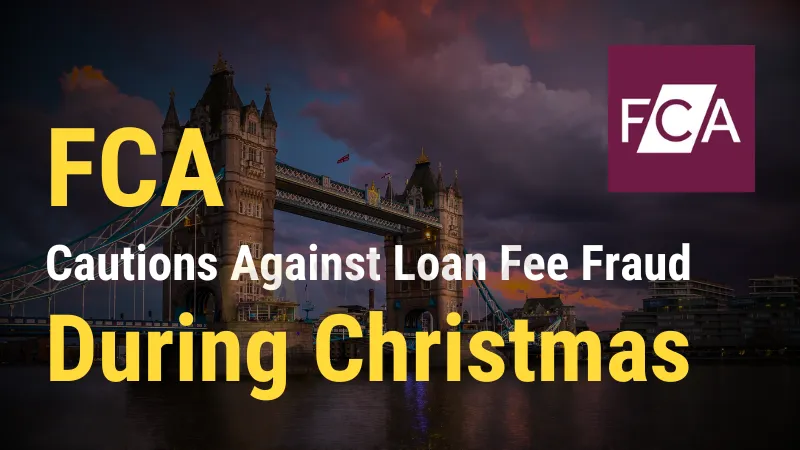简体中文
繁體中文
English
Pусский
日本語
ภาษาไทย
Tiếng Việt
Bahasa Indonesia
Español
हिन्दी
Filippiiniläinen
Français
Deutsch
Português
Türkçe
한국어
العربية
FCA Cautions Against Loan Fee Fraud During Christmas
Abstract:Protect against loan fee fraud this Christmas with the FCA's advice. Stay vigilant on spending and borrowing, and get support from Debt Free Advice.

The United Kingdom The Financial Conduct Authority (FCA) has issued a stern public warning about the growing possibility of loan fee fraud, particularly during the holiday season. This warning comes at a time when many UK citizens, especially parents with small children, are feeling pressured to spend more than they can afford on Christmas festivities.
Rising Concerns Over Christmas Expenditures
Recent findings reveal a startling scenario: approximately 40% of adults in the UK are anxious about their ability to manage the expenses associated with Christmas. This concern escalates to 52% among parents with young children under the age of 18. Consequently, over a quarter (29%) of these parents have either already borrowed money or plan to do so to fund their Christmas spending, thereby making themselves vulnerable to scams like loan fee fraud.
The Threat of Loan Fee Fraud

Loan fee fraud is a particularly insidious type of scam where individuals are tricked into paying fees for loans that they ultimately never receive. On average, victims lose about £255 to such frauds. The FCA emphasizes that with the current financial strains, many households may fall prey to these scams.
FCA's 3-Step Check Against Loan Scams
To safeguard consumers, the FCA has introduced a simple yet effective 3-step check:
Be Cautious of Cold Calls and Emails: Unsolicited contact may be a sign of a scam.
Upfront Fee Requests: Be wary if you're asked to pay fees before receiving a loan.
Unusual Payment Demands: Requests for quick or unconventional payments are red flags.
The FCA urges everyone to verify the legitimacy of loan offers by consulting their Financial Services Register and visiting the loan fee fraud page for more information.
Partnership with Debt-Free Advice
In its commitment to support individuals facing financial challenges, the FCA has partnered with Debt Free Advice, a coalition led by Toynbee Hall. This collaboration aims to offer assistance and guidance to those struggling with debt, especially in these high-pressure holiday periods.
Statements from FCA and Debt-Free Advice Representatives
Therese Chambers, the Executive Director of Enforcement and Market Oversight at the FCA stresses the importance of the public being vigilant against fraudsters who exploit the festive season. “Fraudsters will take advantage even of parents desire to give their children a good Christmas. Remember the 3-step check and protect yourself and your loved ones from loan fee fraud,” she advises.

Matt Dronfield, Managing Director of Debt Free Advice, highlights the societal pressures that lead to financial strain and increased debt during Christmas. He notes the adverse impact of such debt on families, affecting their financial stability, mental health, and overall well-being.
Risk of Unauthorised Firms
The FCA also warns that dealing with unauthorized firms means consumers will not have the protection of the Financial Ombudsman Service or the Financial Services Compensation Scheme (FSCS) if things go wrong.
Learn More and Stay Informed
Those looking for further information and tools on avoiding financial scams and making educated choices might benefit from visiting https://www.wikifx.com/en. This platform provides a plethora of financial information, allowing users to confidently navigate the complexity of the financial world.
In Conclusion: A Call for Vigilance
As the festive season approaches, the FCA‘s message is clear: Stay alert to the risks of loan fee fraud. By following the FCA’s guidelines and utilizing resources like those offered by Debt Free Advice and exploring https://www.wikifx.com/en, individuals can better protect themselves and their families from financial scams and undue stress during this festive season.
Bottom Line
The FCA's efforts in raising awareness about loan fee fraud, especially during the financially demanding Christmas period, underscore the importance of being cautious and well-informed. By staying vigilant and following the FCA's advice, consumers can safeguard themselves against potential scams and enjoy a safer, more secure holiday season.

Disclaimer:
The views in this article only represent the author's personal views, and do not constitute investment advice on this platform. This platform does not guarantee the accuracy, completeness and timeliness of the information in the article, and will not be liable for any loss caused by the use of or reliance on the information in the article.
Read more

Anti-Scam Groups Urge Tougher Action on Fraudsters in UK
Anti-scam groups demand tougher police action on fraudsters as UK fraud rates surge 19%, targeting millions in a penalty-free crime spree exposed by a $35m scam leak.

Philippines Deports 29 Indonesians Linked to Online Scam Syndicate in Manila
Online scam groups in the Philippines trick Filipinos into gambling and love scams, from Manila to Bacolod, causing trafficking and pain as police fight back.

How Reliable Are AI Forex Trading Signals From Regulated Brokers?
Discover how reliable AI Forex trading signals are and why using a regulated broker boosts their effectiveness. Learn key factors to evaluate accuracy and enhance your trading.

Top Currency Pairs to Watch for Profit This Week - March 31, 2025
Discover the top 5 currency pairs to trade for profit this week, March 31, 2025—USD/JPY, EUR/USD, GBP/USD, AUD/USD, USD/CHF—with simple strategies and best times.
WikiFX Broker
Latest News
How Crypto Trading Transforms FX and CFD Brokerage Industry
UK would not hesitate to retaliate against US tariffs - No 10 sources
FCA Warns Against 10 Unlicensed or Clone Firms
CySEC Warns Against 14 Unlicensed Investment Websites
Top Currency Pairs to Watch for Profit This Week - March 31, 2025
Will natural disasters have an impact on the forex market?
Philippines Deports 29 Indonesians Linked to Online Scam Syndicate in Manila
Navigating the Intersection of Forex Markets, AI Technology, and Fintech
Exposed: Deceptive World of Fake Trading Gurus – Don’t Get Fooled!
AI-Powered Strategies to Improve Profits in Forex Trading
Currency Calculator







